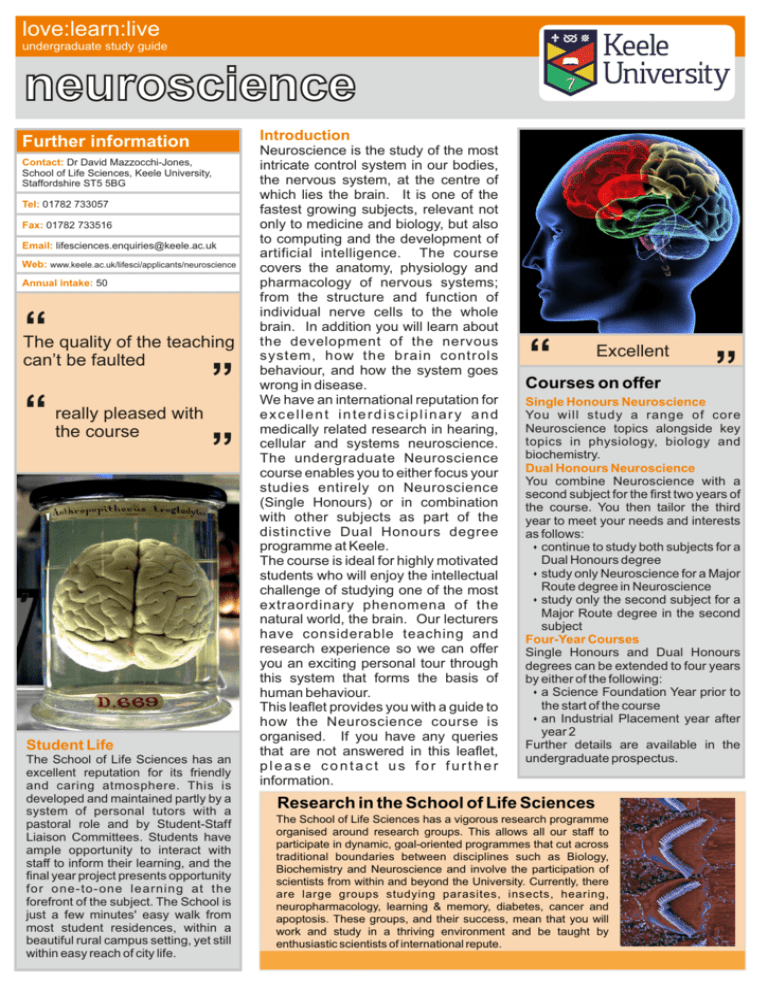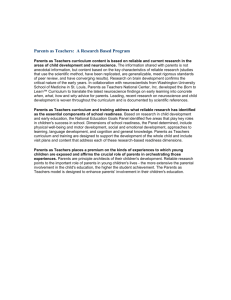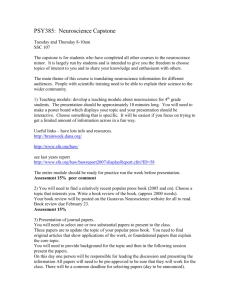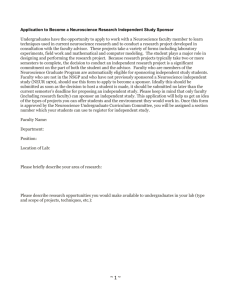neuroscience - Keele University
advertisement

love:learn:live undergraduate study guide neuroscience Introduction Further information Contact: Dr David Mazzocchi-Jones, School of Life Sciences, Keele University, Staffordshire ST5 5BG Tel: 01782 733057 Fax: 01782 733516 Email: lifesciences.enquiries@keele.ac.uk Web: www.keele.ac.uk/lifesci/applicants/neuroscience Annual intake: 50 “ The quality of the teaching can’t be faulted “ ” really pleased with the course ” Student Life The School of Life Sciences has an excellent reputation for its friendly and caring atmosphere. This is developed and maintained partly by a system of personal tutors with a pastoral role and by Student-Staff Liaison Committees. Students have ample opportunity to interact with staff to inform their learning, and the final year project presents opportunity for one-to-one learning at the forefront of the subject. The School is just a few minutes' easy walk from most student residences, within a beautiful rural campus setting, yet still within easy reach of city life. Neuroscience is the study of the most intricate control system in our bodies, the nervous system, at the centre of which lies the brain. It is one of the fastest growing subjects, relevant not only to medicine and biology, but also to computing and the development of artificial intelligence. The course covers the anatomy, physiology and pharmacology of nervous systems; from the structure and function of individual nerve cells to the whole brain. In addition you will learn about the development of the nervous system, how the brain controls behaviour, and how the system goes wrong in disease. We have an international reputation for excellent interdisciplinary and medically related research in hearing, cellular and systems neuroscience. The undergraduate Neuroscience course enables you to either focus your studies entirely on Neuroscience (Single Honours) or in combination with other subjects as part of the distinctive Dual Honours degree programme at Keele. The course is ideal for highly motivated students who will enjoy the intellectual challenge of studying one of the most extraordinary phenomena of the natural world, the brain. Our lecturers have considerable teaching and research experience so we can offer you an exciting personal tour through this system that forms the basis of human behaviour. This leaflet provides you with a guide to how the Neuroscience course is organised. If you have any queries that are not answered in this leaflet, please contact us for further information. “ Excellent Courses on offer ” Single Honours Neuroscience You will study a range of core Neuroscience topics alongside key topics in physiology, biology and biochemistry. Dual Honours Neuroscience You combine Neuroscience with a second subject for the first two years of the course. You then tailor the third year to meet your needs and interests as follows: s continue to study both subjects for a Dual Honours degree s study only Neuroscience for a Major Route degree in Neuroscience s study only the second subject for a Major Route degree in the second subject Four-Year Courses Single Honours and Dual Honours degrees can be extended to four years by either of the following: s a Science Foundation Year prior to the start of the course s an Industrial Placement year after year 2 Further details are available in the undergraduate prospectus. Research in the School of Life Sciences The School of Life Sciences has a vigorous research programme organised around research groups. This allows all our staff to participate in dynamic, goal-oriented programmes that cut across traditional boundaries between disciplines such as Biology, Biochemistry and Neuroscience and involve the participation of scientists from within and beyond the University. Currently, there are large groups studying parasites, insects, hearing, neuropharmacology, learning & memory, diabetes, cancer and apoptosis. These groups, and their success, mean that you will work and study in a thriving environment and be taught by enthusiastic scientists of international repute. Course Structure and Content In each semester, you will normally take two Neuroscience modules and two from your other subject (Dual Honours and Major Route) or four Neuroscience modules (Single Honours). In the third year, Major Route Neuroscience students specialise in Neuroscience and take four modules in each semester instead of two. In the final year, students are able to undertake an individually supervised project and/or dissertation. The following Neuroscience modules are currently on offer. Core modules for Dual Honours are shown in bold, asterisk denotes modules only on offer to Single Honours students. Note that advertised modules are subject to change. Semester 1 “ All members of staff were very approachable and helpful - brilliant! ” Semester 2 Year 1 Introduction to Neuroscience Cell and Molecular Biology Human Physiology and Pathology Neurophysiology Genetics and Evolution Metabolism: Major Metabolic Pathways* Cells and Organelles* Teaching and Assessment Year 2 Neuroscience Research Methods From Neurone to Brain Learning and Memory Neurodevelopment Neuropharmacology Neuroanatomy* Endocrinology and Cell Signaling* Year 3 Special Senses Neurobiological Basis of Brain Disease Current Topics in Neuroscience Behavioural Neurobiology Regeneration and Repair in the Nervous System Research Project (Double/Single) Dissertation/Non-Experimental Project The majority of modules take place over a 12-week period and consist of: s two lectures per week covering the theoretical groundwork of the topic s practical classes of 2-3 hours each week which demonstrate the different concepts of the topic via hands-on experience s tutorials each semester for open discussion of ideas, essay feedback and revision Assessment is both continuous, based on coursework including practical writeups and essays, and by examination at the end of a module. Student Support The course has a student-staff liaison committee which has both lecturers and students as members and which meets regularly to discuss modules and any problems that may arise. Each student is assigned to a personal tutor to help with academic matters and to provide advice and pastoral care. There are Universitywide support systems like Student Support, the Counselling Service and Resident Tutors. Career Opportunities Research Project Work on a Neuroscience research question in a laboratory under staff supervision. Students pick a number of projects from a list and we allocate each student a project. This typically occupies 1-2 days per week and allows you to take part in research, data analysis and writing-up. You also explore the topic using the library and on-line access to research journals. Study Abroad There are opportunities to study abroad for one semester at one of Keele's many partner universities around the world, for example in the USA, Canada, Australia or another part of Europe. This replaces one semester of the second year at Keele. There is a wide range of careers available to neuroscience students on graduation. The most popular science subject combinations with Neuroscience are Psychology, Biochemistry and Computer Science. These combinations offer opportunities for careers in, for example, medically related psychology, the chemical and pharmaceutical industry, or in information technology, and many students develop interests that lead to a higher degree and a career in research. However, non-science combinations with Neuroscience also offer a wide range of opportunities e.g. combining with Finance or Economics puts you in a unique position for a career in the modern Health Service as it would underpin both the business and the scientific side of health management and administration.




